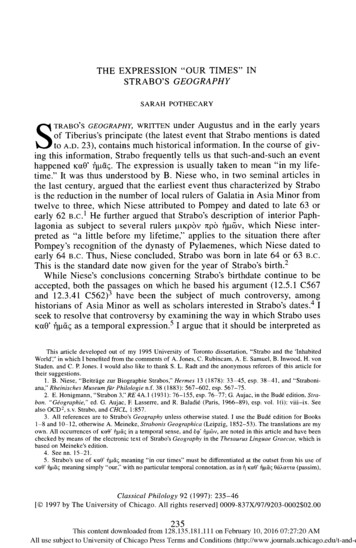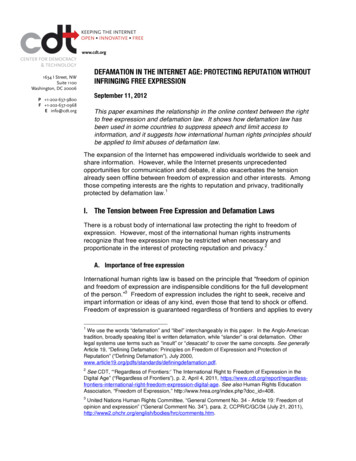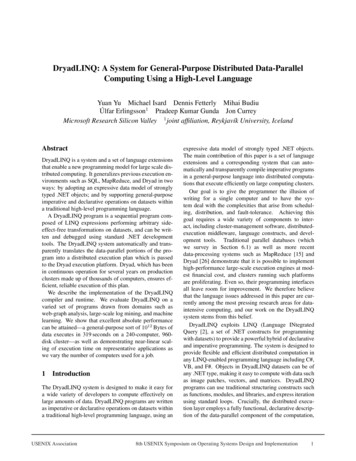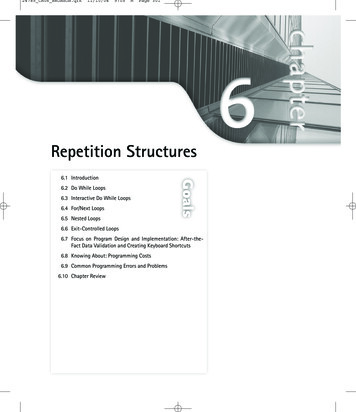
Transcription
THE EXPRESSION "OUR TIMES" INSTRABO'S GEOGRAPHYSARAH POTHECARYGEOGRAPHY,WRITTEN under Augustus and in the early yearsof Tiberius's principate (the latest event that Strabo mentions is datedto A.D. 23), contains much historical information. In the course of giving this information, Strabo frequently tells us that such-and-such an eventhappened KaO' f4tdc. The expression is usually taken to mean "in my lifetime." It was thus understood by B. Niese who, in two seminal articles inthe last century, argued that the earliest event thus characterizedby Strabois the reduction in the number of local rulers of Galatia in Asia Minor fromtwelve to three, which Niese attributedto Pompey and dated to late 63 orearly 62 B.C.' He further argued that Strabo'sdescription of interior Paphlagonia as subject to several rulers [ttKpOV Rp6 [tCov,which Niese interpreted as "a little before my lifetime," applies to the situation there afterPompey's recognition of the dynasty of Pylaemenes, which Niese dated toearly 64 B.C. Thus, Niese concluded, Strabo was born in late 64 or 63 B.C.This is the standarddate now given for the year of Strabo'sbirth.2While Niese's conclusions concerning Strabo's birthdate continue to beaccepted, both the passages on which he based his argument (12.5.1 C567and 12.3.41 C562)3 have been the subject of much controversy, amonghistorians of Asia Minor as well as scholars interested in Strabo'sdates.4 Iseek to resolve that controversy by examining the way in which Strabo usesKaO'r [tda as a temporal expression.5 I argue that it should be interpretedasSTRABO'SThis article developed out of my 1995 University of Toronto dissertation, "Strabo and the 'InhabitedWorld',"in which I benefited from the comments of A. Jones, C. Rubincam,A. E. Samuel, B. Inwood, H. vonStaden, and C. P Jones. I would also like to thank S. L. Radt and the anonymous referees of this article fortheir suggestions.1. B. Niese, "Beitrage zur Biographie Strabos,"Hermes 13 (1878): 33-45, esp. 38-41, and "Straboniana,"Rheinisches Museumfir Philologie n.f. 38 (1883): 567-602, esp. 567-75.2. E. Honigmann, "Strabon3,"RE 4A.1 (1931): 76-155, esp. 76-77; G. Aujac, in the Budd edition, Strabon. "Ge'ographie,"ed. G. Aujac, F Lasserre, and R. Baladie (Paris, 1966-89), esp. vol. l(i): viii-ix. Seealso OCD2, s.v. Strabo, and CHCL, 1:857.3. All references are to Strabo's Geography unless otherwise stated. I use the Bude edition for Books1-8 and 10-12, otherwise A. Meineke, Strabonis Geographica (Leipzig, 1852-53). The translationsare myown. All occurrences of KaG'icpd in a temporal sense, and ?p' f[t6v, are noted in this article and have beenchecked by means of the electronic text of Strabo'sGeography in the ThesaurusLinguae Graecae, which isbased on Meineke's edition.4. See nn. 15-21.5. Strabo'suse of KaGf11ia; meaning "in our times" must be differentiatedat the outset from his use ofKaG'nHP' meaning simply "our," with no particular temporal connotation, as in i KaO f1Pdc O0XaTTa (passim),Classical Philology 92 (1997): 235-46[? 1997 by The University of Chicago. All rights reserved] 0009-837X/97/9203-0002 02.00235This content downloaded from 128.135.181.111 on February 10, 2016 07:27:20 AMAll use subject to University of Chicago Press Terms and Conditions (http://www.journals.uchicago.edu/t-and-c
236SARAHPOTHECARYmeaning not "in my lifetime" but, more literally, "in our times" or "in mytimes" (since Strabo does sometimes use the first person plural pronoun inplace of the singular). "Ourtimes" or "my times" signifies the period leading up to, and including, the period of Strabo'sown activity and that of hisapproximatecontemporaries,and is the latest of the historical periods intowhich Strabo divides the events of the past. "Our times" begin not withStrabo'sown birth, but with a historical event of enormous importance forAsiatic Greeks like Strabo, namely Pompey's reorganizationin 65-63 B.C.of the lands that had constituted the kingdom of Pontus under King Mithridates VI Eupator, defeated by the Romans under Pompey in 66 B.C.6Pompey's reorganization symbolized the end of a dynasty that had lastedfor some two centuries and marked the beginning of a period in which thecore of Mithridates'kingdom initially came under Roman provincial rule,while other areas were subject to local rulers who had found favor with theRomans.7Mithridateshad used an era based on an epoch of 297 B.C., probably the date claimed for the start of the Pontic kingdom,8 but in the ensuing Roman period, new epochs were adopted.9As well as altering the whole political complexion of Asia Minor, thedownfall of MithridatesVI and Roman intervention affected Strabo'sownfamily fortunes. Strabo's family was from Amaseia, part of the old kingdom of Pontus. Family members from his grandfather'sgeneration, hisgeneration had enjoyedgreat-grandfather'sand his great-great-grandfather'sintimacy with Mithridates VI and his predecessor, Mithridates V. Duringthe later stages of the conflict between MithridatesVI and the Roman state,some of Strabo'sfamily had decided to go over to the Roman side. Strabo'sgreat-greatuncle had betrayedMithridates,only to be found out by the kingand punished. Strabo'sgrandfatherhad managed to betray Mithridateswithout being discovered, although Strabo complains that the promised rewardfrom the Romans never materialized.10The impact of Roman interventionon the political history of Asia Minor,and on Strabo'sperception of it, is evident in Strabo'sdescriptions of thoseareas that had once formed part of the kingdom of Pontus or had comeunder its influence. Strabo organizes these historical accounts around twowhich translates as "our sea" and designates the Mediterraneanand Pontus (Strabo also uses the term "ourseas"); similarly, "our coast" (passim). meaning the coast of "our sea", "our inhabited world" (passim),"our part" or "our quarter"[sc. of the earth], "our hemisphere," "our temperate zone," and so on.6. D. Magie, Roman Rule in Asia Minor, vol. 1: Text,vol. 2: Notes (Princeton, 1950), esp. 1:351-78,and S. Mitchell, Anatolia, Land, Men, and Gods in Asia Minor, vol. 1. The Celts in Anatolia and the Impact of Roman Rule (Oxford, 1993), 31-34.7. See Strabo'sown descriptionat 12.3.1-42 C540-563.8. For the evidence of Mithridates'coinage, W. H. Waddington,T. Reinach, and E. C. F Babelon,Recueilgene'raldes monnaiesgrecques dAsie Mineure2,vol. 1, fasc. 1: Pont et Paphlagonie (Paris, 1925; reprint,NewYorkand Hildesheim, 1976), 8, 13-20, and Magie, 2:1087, n. 35.9. The dates of the epochs varied from place to place. For a list of the coins and inscriptionsthat provideevidence for the dates of the epochs, and for the dates at which the epochs were adopted,C. Marek,Stadt,Around Territoriumin Pontus-Bithvniaund Nord Galatia (TUbingen,1993), 129-34. See also IGR, vol. 3 (Paris,1906), esp. nos. 85, 89, 90, 91; Magie, 2:1180, n. 43; p. 1181, n. 45. A. H. M. Jones, The Cities of the EasternRoman Provinces2 (Oxford, 1971), 202, and p. 437, n. 17; A. E. Samuel, Greek onld'Roman Chronology (Mu-nich, 1972), p. 246 and n. 4; p. 247 and n. 1.10. 10.4. 10 C477-78, 11.2.18 C499, 12.3.33 C557.This content downloaded from 128.135.181.111 on February 10, 2016 07:27:20 AMAll use subject to University of Chicago Press Terms and Conditions (http://www.journals.uchicago.edu/t-and-c
THE EXPRESSION "OUR TIMES" IN STRABO's GEOGRAPHY237main timeblocks: the first, up to Mithridates'defeat; the second, beginningwith Roman intervention. Events within the first timeblock may be allocated to "long ago" or a situation may be described as "always" havingbeen the case, while later events still within the first timeblock may be described as happening in "the period of kings" or, more specifically, "underMithridates."These events and situations are contrasted with occurrencesin the second timeblock, where situations may be attributedto Pompey inparticular,or to the Romans generally, and may then be brought up to datewith an account of the situation "now," or an account couched in thepresent tense. Strabo sometimes uses a [t?v . . . & construction to contrastthe situation in the first timeblock with the second.Describing Comana, a temple that had played an important role in thekingdom of Pontus, Strabo contrasts, by means of a [?v . &? construction, its status "in the time of the kings" (?ti -Cov Pa3cytkXov) with the situation "after Pompey took over" (napakac3v flo[tnuito0 -cv 6'ouciav) andappointed Archelaus as priest (12.3.34 C558); then he tells us that thepriesthood is "now" held by Dyteutus (12.3.35 C558). For the temple atZela, Strabo first contrasts, using a [?v . 6 construction, the honors received by the priests from "the kings" with the situation "now" when everything is subject to Pythodoris; then Strabo reiterates his point, contrasting(again with a [dV . . .6 construction) the situation "long ago" when "thekings" ran Zela not as a city but as a temple and when everything wassubject to the priest, with the enlargementand organizationof Zela as a cityby Pompey (12.3.37 C559-69). Strabo has already had occasion to mention Zela earlier, where he similarly noted its organization under Pompey"after the destruction of Mithridates" (gET&T1v MtOpt66ToUKacLkLXUtV,11.8.4 C512).Describing Colchis, Strabo briefly gives its history before Mithridates'defeat, contrasting the mythical period of "long ago" (-c6 takaL6v)with theperiod when Colchis was divided between kings and ultimately acquiredby Mithridates "when his power had increased" (aw54qOvto5 MtOpt66-ou,11.2.18 C498-99). Strabo then outlines the situation in Colchis -cou),11beginning with theimmediate situation and ending with what has happened "last," or "mostrecently" (iUa-cyaa).Amisus was held by "the kings" and was enlarged andimproved by Mithridates;its subsequent fortunes were varied, but "now" itis well constituted (12.3.14 C547). Sinope was autonomous "for a longtime" (tokiWvXp6vov);it was then enslaved by Pharnaces(a king of Pontus)and his successors "up until Eupator and the Romans who destroyed him"Poatciov); "now" it has a col([t?Xpt -oiE Eu'T5topos Kai rCVKac-akUcYcV-cO)V'Pony of Romans (12.3.11 C545-46). The area held by the Tibareni and theChaldaei was "always" held by dynasts; "when Mithridates'power had increased" (au'iiOqWtMtOpt66-cioE') Uzaop) the area came under his dominion; Pompey founded a city in the area, which is "now" well populated(12.3.28 C555).11. For Strabo, KaTaX6C)GOat means "to be finished" in the sense of having one's career ended, not necessarily of being killed. Pompey defeated Mithridatesin 66 B.C., but Mithridatesdid not die until 63 B.C.This content downloaded from 128.135.181.111 on February 10, 2016 07:27:20 AMAll use subject to University of Chicago Press Terms and Conditions (http://www.journals.uchicago.edu/t-and-c
SARAHPOTHECARY238In Strabo's account of Galatia, an area bordering on Pontus that had lainbeyond Mithridates'directcontrol, Straboagain organizes his materialaroundtimeblocks, contrasting (by a 1v . 6& construction) the organization ofGalatia "long ago" with the political situation"in our times" (KaO'fads), before describing the situation "now." Since this passage is one of the twoon which Niese based his arguments, it is worth quoting it in full (12.5.1C567):flaiaticV OUV rV TOtaUTqCITTa 6iqVa'KCVXOUM TPo4altot6VTCqTtiif 6UVacTTia,Kalt TaQTfVKSal6IQTaQIt,i'KaO1ji&qAftl6TapOV,& CiqTpClq,CIT?CIT CKCIVOV 61CiaTOTfV 67TOTO AJD5VTa 7yvOicvivfv?i1STavciq 66o i7?46vaq,ViV 6'AJUSVTaciqav yuvayay-CThPXiaV.Such, then, was their organization long ago. In our times, power passed to three, thentwo chiefs, then one, Deiotarus, whom Amyntas succeeded. Now the Romans possessboth this [sc. region, i.e., Galatia] and the whole [sc. region] that used to belong to Amyntas, and have united it into one province.Strabo has just described how the Galatians originally came to be in possession of their lands and how their three tribes-the Tolistobogii, the Trocmiand the Tectosages-each came to be divided into four tetrarchies (eachheaded by a tetrarch), making a total of twelve tetrarchies in all. It is thisorganization that characterizes the period "long ago." In order to date the"passing of power to three" that Strabo attributes to "our times," Nieseturned to the beginning of Strabo's description of Pontus where Strabo,after first giving the extent of the kingdom as held by Mithridates,goes onto describe Pompey's activities "after he had destroyed him [i.e., MithriEKCIVOV, 12.3.1 C540-41). Strabo's account includesdates]" (Kataik)saPompey's policy concerning Galatia and interior Paphlagonia, which, likeGalatia, had lain beyond Mithridates'direct rule. We are told that Pompey"handed over certain parts [sc. of the interior lands of the Paphlagonians]to the members of the dynasty of Pylaemenes to rule, just as he also [sc.handed over] the Galatians to the hereditary tetrarchs" (Xtv&a pacXytk6aOatRapcp6(OKC TOTs anoIIlUkatRVOUl,KaOcLEpKait To)FXakdTaTots&tu6y?-vou1 TcTpcpXatL). Niese identified Pompey's handing over of the Galatians"to the hereditarytetrarchs"at 12.3.1 with the passing of power "to three"at 12.5.1. Niese concluded that the passing of power "to three" took placeat the hands of Pompey, and that it should be dated to late 63 B.C. or early62 B.C. Therefore, according to Niese's interpretation of Kac' fltag as "inmy lifetime," Strabo was already alive by this date.12There are two main problemswith Niese's argument.The firstconcerns theinterpretation"in my lifetime." Are we to suppose that Strabo's audienceknew the date of his birth?13 Is Strabo really using his birthdateto date anevent in Galatianhistory?Would it anyway be meaningful for Straboto char12. Niese, "Beitrage," 40 and "Straboniana,"568-69. Magie, 1:373, and 2:1235, n. 40, accepts Niese'sidentificationand interpretation.13. Honigmann, "Strabon3," cols. 77, 87, accepts Niese's interpretation"in my lifetime" and a birthdatefor Straboof 64/63 B.C., yet recognizes that the significance of 64/63 B.C. is that it coincides with the Romanincorporationof Asia Minor. Honigmann suggests that the coincidence would have been noted in Strabo'shistory (Strabo's only other known work, now lost). It is much simpler to eliminate the issue of Strabo'sbirthdatealtogether and to see "our times" as referringdirectly to the period following Roman incorporationThis content downloaded from 128.135.181.111 on February 10, 2016 07:27:20 AMAll use subject to University of Chicago Press Terms and Conditions (http://www.journals.uchicago.edu/t-and-c
THE EXPRESSION "OUR TIMES" IN STRABO's GEOGRAPHY239acterize an event as early as 63 or 62 B.C. as happening "in my lifetime"when, on Niese's own calculations, Strabo would have still been a new-bornbabe? How were the audience supposed to realize that the event dated rightfrom the beginning of Strabo's lifetime? The second problem is that Niesehad no real basis on which to identify the passing of power "to three" withPompey's handing over of the Galatians "to the hereditarytetrarchs,"as hiscritics pointed out.14 The position adopted in this article is that, givenStrabo's contrast of KWLO g with "long ago," that is, the first timeblock,he is using the expression to mean not "in my lifetime" but "in our times"and to indicate the second timeblock, the period beginning with Pompey'sreorganization. Strabo'sinterest is in characterizingthe situation in Galatiafollowing Roman intervention, which he does by telling us that "in ourtimes, power passed to three, then two chiefs, then one," etc. There is no evidence for any event laterthanPompey'sreorganizationitself to which powerpassing "to three" might apply;15and the interpretationof KWL'ipdt as "inour times" would preclude identifying the passing of power "to three" with[i4td in this arany earlier event. Ironically, then, the interpretationof KWLOticle supports Niese in his identification of power passing "to three" withPompey's handing over of Galatia to "the hereditarytetrarchs."This vindication of Niese's identification is, however, at the expense of his own interpretationof KWO'gd; and thus his conclusions concerning Strabo'sbirthdate.Niese saw the passing of power "to three" and Pompey's handing over to"the hereditarytetrarchs"as indications of a direct reduction by Pompey ofthe original twelve tetrarchsof Galatia to three. It is possible, however, thatthe process of change in Galatia had already started before Pompey's reorganization, perhaps in 86 B.C., when Mithridates murdered most of theGalatian tetrarchs.16In the case of Tolistobogii, at least, tribal power mayhave already been concentrated in the hands of one tetrarch at the timeof the reorganization, for one of the tetrarchs established or confirmedby Pompey was Deiotarus,17presumably the same Deiotarus whom Straboof Asia Minor. The concept of "our times," however, may have been reinforced in Strabo's history, thebulk of which began where Polybius' history left off (11.9.3 C515), i.e., 146/145 B.C., and probablyfinished some time in or after the mid-20s B.C. (D. Ambaglio, Gli Historika Hypomnemata di Strabone[Milan, 1990], F20).14. P. Meyer, "Quaestiones Strabonianae,"Leipziger Studien zur Classischen Philologie 2 (1879): 4972, esp. 50, 54, argued that the passing of power "to three" could not be dated and could not therefore beused to establish Strabo'sbirthdate,which Meyer put in 68 B.C. Meyer was rebuttedby Niese, "Straboniana,"568. Then G. F. Unger, "Umfang und Anordnung der Geschichte des Poseidonios," Philologus 55 (1896):245-56, esp. 249-50, argued that the passing of power "to three"took place in 66 B.C. at the latest and thatStrabo was therefore already alive at that date, and he, too, moved Strabo'sbirthdateearlier, putting it in 67166 B.C. A. Gercke, "Warder Schwiegersohn des Poseidonios ein Schuler Aristarchs?"Rheinisches Museumfur Philologie n.f. 62 (1907): 116-22, esp. p. 119 and n. 1, argued that the date of Pompey'sreorganizationinGalatia was unknown and therefore did not provide a terminus ante quem for Strabo'sbirth (which Gerckeput between 66 and 60 B.C.).15. Niese, "Straboniana,"569. For the dating of the subsequent passage of power "to two" and then "toone," see Coupry, in J. Coupry and Remzi Oguz Arik, "Les Tumuli de Karalaret la sepulturedu roi Deiotaros II,"Revue ArchJologique, 6th series, 6 (1935): 133-51, esp. 140-50.16. App. Mith. 46. Mitchell, Anatolia, 1:29 and n. 20, sees Strabo's description of power passing "tothree" as referringto a reduction in the wake of this massacre and argues that, when Strabo places the eventin our times, he "should not be taken literally."17. App. Mith. 114, Syr. 50. Magie, 2:1235-38, nn. 40-41; p. 1275, n. 58; p. 1276, n. 60; Mitchell, Anatolia, 1:33-36; and Syme, Anatolica, 127-36, identify this Deiotarus with the Deiotarus who, according toStrabo at 12.5.1 C567, ended up as sole Galatian leader.This content downloaded from 128.135.181.111 on February 10, 2016 07:27:20 AMAll use subject to University of Chicago Press Terms and Conditions (http://www.journals.uchicago.edu/t-and-c
240SARAH POTHECARYdescribes, at the later point in time when Pompey made him a king, as "alsoholding the tetrarchyof the Galatians, the Tolistobogii, inherited from hisfather" (EXOVTctKactTiV 7ccLTpOaV TETpcLpXtcLVT(oV aXraTJ!v, -rou 7y ToXtaTo3o)ytfoug, 12.3.13 C547). Whatever political changes had already takenplace in Galatia prior to Pompey's activities, it is not to any such changesthat Strabo refers when he tells us that "in our times" power passed "tothree,"but to Pompey's reorganization itself even if, as is now often supposed,18 this constituted a clarification or ratification,ratherthan a one-offreduction from the twelve of "long ago."The other passage on which Niese based his argumentfor Strabo'sbirthdate concerns interiorPaphlagonia.In Strabo'sfrustratinglybrief account ofthis area, the situation "now" is contrasted (by means of a p%v . . . 6? construction) with the situation "a little before our time" (pttKpOv rpo fptcov).Again, this importantpassage is worth quoting in full (12.3.41 C562):Ta6Nr 6c, KculTp 6Xiy1N o6liuT, AtKp6V piEV 7Zp6Toiuy7vovUqThV OMX eV WKtn6OVTO;.'PW,ucMot,u7OVIpXoV nitOoU,VVV6' EXOuaIThis [sc. region], though small, was subject to several rulers a little before our times, butnow is subject to the Romans, since the royal family has died out."Several"is used by Strabo to mean several simultaneously ratherthan successively. We are left wondering who the "several rulers"are. Niese arguedthat the "several rulers" should be identified with "the members of thedynasty of Pylaemenes" to whom Pompey "handed over" these parts ofPaphlagonia, just as he also handed over the Galatians "to the hereditarytetrarchs"(12.3.1 C541).19 Niese dated Pompey's activities in Paphlagoniato the first half of 64 B.C. and, interpretingpIKp6V ipO 4tJovas "a little before my lifetime," argued that Strabo must have been born after that date.Again, there is no real basis for Niese's identification of the "several rulers" with the Pylaemenids after Pompey had "handedover" interiorPaphlagonia to them. It seems unlikely that Strabois attemptingto date the "severalrulers" by reference to his birthdate, which the audience would have toknow very precisely in order for the expression "a little before my time"to be meaningful. If, however, the expression means, in effect, "a little before Pompey's reorganization,"then the "several rulers" would be thosewho were in power not after, as Niese argued, but before Pompey clarifiedthe situation by handing over interior Paphlagonia "to the members of thedynasty of Pylaemenes."Indeed, several historians have made this link andin doing so have tacitly rejected Niese's identification.20Beyond that, theidentity of the "several rulers"remains unsolved. They may have includedthose Pylaemenids later recognized by Pompey or they may have been the18. Lasserre,G&ographie,9:119, n. 2; Syme, Anatolica, 129; Coupry,"Les Tumulide Karalar,"133-51,esp. 143.19. Niese, "Beitrage,"38-40.20. Jones, Cities, 162, and p. 424, n. 29, thinks that Strabo'sreference is to petty principalitiesinto whichPaphlagonia disintegrated under Mithridates, before Pompey handed it over to the Pylaemenid dynasty.Syme, Anatolica, 1 13, argues that the "several rulers,"since they are put before Strabo'sbirth in 63 B.C., areunlikely to be the rulers after Pompey's reorganization(although it was partly by making this identificationthat Niese came up with Strabo'sbirthdateof 63 B.C. in the first place).This content downloaded from 128.135.181.111 on February 10, 2016 07:27:20 AMAll use subject to University of Chicago Press Terms and Conditions (http://www.journals.uchicago.edu/t-and-c
THE EXPRESSION "OUR TIMES" IN STRABO's GEOGRAPHY241dynasts in power before Mithridates'defeat, whose existence Straboimplieswhen he tells us that this part of Paphlagonia was subject to dynasts "evenafter the destruction of Mithridates"(12.3.9 C544).21Elsewhere in his treatmentof Asia Minor, Strabo'susage of "our times"as a timeblock similarly suggests that it refers to the period beginning withPompey's reorganization. For the Amanus mountain range to the east ofPlain Cilicia, Strabo contrasts, with a .ev . . 6%construction, the fact that itwas "always held by several tyrants" (d&t pthv1T'6 nkIXt6vov 6uvcrTgFu6Opvov TupcLvv(ov)with the fact that "in our times" one man, Tarcondimotus,was established as "lord of the whole region" (cu'ptoq nTrLvTov, 14.5.18C676).22 The political nature of the contrast suggests that Pompey at leastconfirmed Tarcondimotus,23even though he may have been in power earlier. Describing Cataonia, Strabo points out that "the ancients"considered itto include Melitene and to be separate from the rest of Cappadocia; thatCataonia and Melitene are each one of the ten YTpatrf7y'tatconstituting Cappadocia as it was held by "the kings of our times" before Archelaus, andthat "in our times" Melitene and Cataonia each had their own GYTpatrf7yo(12.1.2 C533-34). Strabo'swords do not preclude the possibility that the division into YTpaTfl7yiatpre-dates Pompey,24and that Pompey confirmed orclarified the existing divisions. Strabo also mentions that Dyme in Achaeawas "earlier"called Stratus, and "still earlier" Paleia, then tells us that "alittle before our times" it received as colonists some of the pirates from thepirate-bands that Pompey had destroyed (8.7.5 C387-88). Pompey won amajor naval battle against the pirates off the coast of Rough Cilicia in 67B.C.,25 and probably resettled some of them at Dyme soon thereafter."Our times" are characterizednot only by the political situation but alsoby the famous people from the various cities of Asia Minor and the Asiancoast who were active in this period. Strabo often contrasts them with earlier, sometimes mythical, persons. He introduces them with the formula "inour times, such-and-such a person was notable" or "such-and-sucha notable person lived,"26meaning that the activities for which they are famousextended into, or began during, "our times" (not necessarily that they were21. Meyer, "Quaestiones Strabonianae,"57-58, identified the "several rulers"with the dynasts in powerbefore Mithridates'destruction, which allowed him to put Strabo'sbirth earlier than Niese had, in 68 B.C. Inresponse, Niese, "Straboniana,"570-75 denied that the "several rulers" are the dynasts in power beforeMithridates'destruction. Unger, "Umfang und Anordnung,"250-51, argued that, since the "several rulers"were in power before Strabo'sbirth, which Unger dated to 67/66 B.C., they can be identified with the dynastsbefore Mithridates'destruction, and concluded that Strabo's"several rulers"must be a reference to the members of the Pylaemenid dynasty before Pompey handed over power to them.22. Magie, 2:1240, n. 53, translates "lord of several tyrants,"but ir6NvT means the "whole region" (cf.VUVt 6? ?ltTn fU00o6wpi6tirdVT-' ?-Tiv,12.3.37 C559). Strabo's contrast suggests that Tarcondimotus was, atleast officially, the only dynast.23. Jones, Cities, 202, and p. 437, n. 18, and Syme, Anatolica, 161. See also Magie, 2:1240, n. 53;R. Syme, Roman Papers, vol. 1, ed. E. Badian (Oxford, 1979), 129, and G. W. Bowersock, Augustus andthe Greek World (Oxford, 1965), 46.24. For the earlier existence of the CTpnTTryiftt, Magie, 1:493; Lasserre, Ge'ographie, 9:47, n. 2.25. Magie, 1:298-301, 357.26. Those notable "in our times" are: from Mytilene, Potamon, Lesbocles, Crinagorasand the historianTheophanes who, Strabo tells us, became a friend of Pompey (13.2.3 C617); from Pergamon, Mithridates,friend of Julius Caesar, and Apollodorus the rhetor, friend of Augustus (13.4.3 C625); from Miletus,Aeschines the rhetor, a critic of Pompey (14.1.7 C635); from Erythrae,Heracleides the Herophileian medical doctor ( 14.1.34 C645); from Tralles, Pythodorus, friend of Pompey, and Menodorus, killed by DomitiusThis content downloaded from 128.135.181.111 on February 10, 2016 07:27:20 AMAll use subject to University of Chicago Press Terms and Conditions (http://www.journals.uchicago.edu/t-and-c
242SARAHPOTHECARYborn "in our times");27and two notables are described as living "a little before our times."28Rulers and leaders (in Asia Minor and beyond) succeed orreign during, or commit deeds at various points within, "our times";29or,in the case of Bogus and Bocchus, succeed "a little before our times."30Intellectual opinions are held, and scholarly works produced, "in our times."31In a closely related usage, KcaO'ptda is used to qualify nouns that havea verbal meaning, like "ruler,""king,""philosopher,"etc., or to qualify theproper names of individuals denoted by such nouns. In these contexts,the expression maintains its temporal sense and may be rendered "of ourtimes."32In Egypt, for example,33 Cleopatra is described as "queen of ourtimes" (14.6.6 C684),34 and her father as Auletes "of our times" (17.1.11C796).35 Tiberius, the emperor at the time Strabo was completing hiswork, is called "the leader of our times" (o6KcO'fidp i? iV, 13.4.8 C627);the superiority"of the leaders of our times" (Xxv KcaO'ida fy746vO)v) is aAhenobarbus (14.1.42 C649); from Cnidus, Theopompus, friend of Julius Caesar, and his son Artemidorus (14.2.15 C656); from Halicarnassus, Dionysius the historian (14.2.16 C656); from Cos, Nicias thetyrant (14.2.19 C653); from Mylasa, the rhetors and city leaders, Euthydemus and Hybreas (14.2.24C658-60); from Seleucia, the Peripatetic philosophers Athenaeus, friend of Murena, and Xenarchus,friend of Augustus and teacher of Strabo (14.5.4 C670); from Sidon, Boethus, with whom Strabo studied,and Boethus' brother, Diodotus (16.2.24 C757); from Tyre, Antipater (16.2.24 C757).27. Correct translation is importanthere since, in many cases, Strabo's words are the best evidence wehave for the dating (albeit only broad) of such individuals. H. L. Jones, The Geographv of Strabo, vols. 1-8(Cambridge,MA and London, 1917-32), esp. vol. 6, consistently mistranslates,e.g., "born . in my time"(143), "in my time . was born"(243), "here were born in my time . . ." (335).28. From Tyre, Apollonius (16.2.24 C757); from Ascalon, Antiochus the philosopher (16.2.29 C759). Inthe case of Antiochus, Jones, Geography,7: 277, mistranslates"was born a little before my time."The meaning is ratherthat Antiochus lived (and died) a little before our times. Antiochus, who was born ca. 130 B.C.,is attested in Syria in 69 B.C. "shortly before he died" (Cic. Luc. 61). His death is therefore put in 68 or 67B.C. by J. Barnes, "Antiochus of Ascalon" in Philosophia Togata, ed. M. Griffin and J. Barnes (Oxford,1989), 52-59.29. Events happening"in our times": a shrine in Moschice near Colchis was sacked by Pharnaces(a kingof Bosporus) (11.2.17 C498); Ilium was improved by Julius Caesar (13.1.27 C594); Nora in Cappadociawasthe treasure-hold of Sisines (12.2.5 12.2.6 C537 in editions before Kramer)
STRABO'S GEOGRAPHY SARAH POTHECARY STRABO'S GEOGRAPHY, WRITTEN under Augustus and in the early years of Tiberius's principate (the latest event that Strabo mentions is dated to A.D. 23), contains much historical information. In the course of giv- ing this information, Strabo frequently tells us that such-and-such an event happened KaO' f4tdc.











